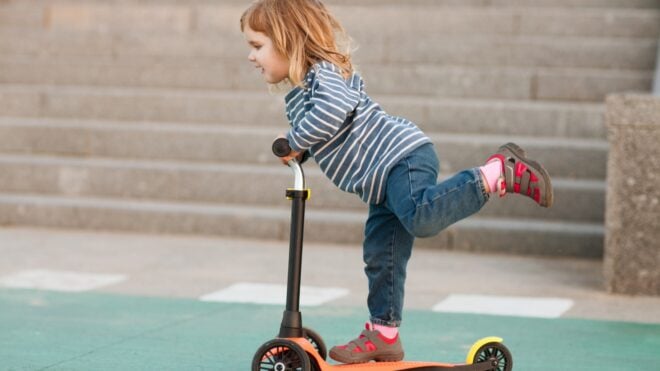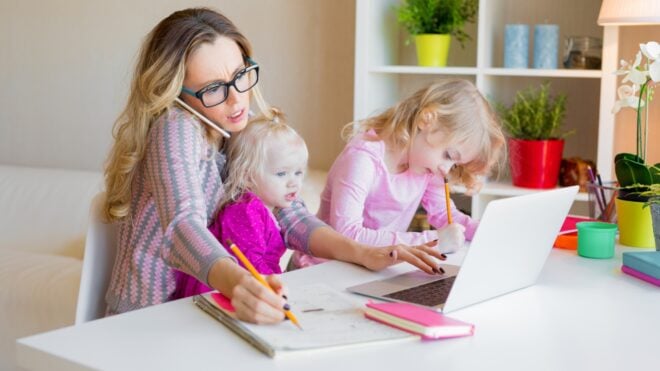Stop finishing your kid's tower, directing their pretend cooking at the pretend kitchen, or crafting their craft for them. You might think you're helping your child, but you're not.
If play becomes a drag, kids won't want to do it anymore, and you might be harming their development too, Richard Rende writes in this article for Psychology Today. There's plenty of science backing up the benefits of unstructured free play, especially in young children.
The idea is simple: Kids need time to play on their own and with other children, free of parental feedback or direction. What's hard is convincing some parents to back off.
RELATED: It Took Me Years to Get Over My Moms Lack of Body Confidence
If you've ever been in the kids' section of your local library, you know three kinds of parents. Some ignore their kids completely, often engrossed in their phones or books, even when their kid is whacking another on the head. Other moms and dads intervene only when needed to settle a sharing dispute. And finally, some parents are totally involved as micromanagers of their child's play. The kids in the last group have never seemed to be having much fun. It turns out there's a reason for that—kids need free play.
What's the problem with parents being involved?
Education in the United States has been moving toward standards-based teaching and testing for years now. Whether that's been a good move is yet to be known.
We parents bring our own perceptions, rules and structure along with us. When we impose that on kids, we hurt them in some pretty significant ways. Unstructured play helps kids form social skills and bonds, grow emotional maturity and develop cognitive skills. It improves children's self-directed executive functioning, says one study by psychologists at the University of Colorado. That means kids learn to regulate their own behavior rather than having parents regulate it for them.
Sounds good to me.
But we've also collectively and systemically been ruining playtime by reducing play as a part of the education system. Citing a need to maximize class time, some elementary schools have eliminated recess. School funding, which is tied to schools' performance on testing, should not take precedence over what's best for our kids. Such policies also hurt our efforts to raise a generation of healthy, active kids.
As my toddler nears her third birthday, the buzz at our playgroups is all about preschool. We all want to know the when, where and waitlist. I recently confessed to a preschool teacher who was visiting our local library that I was behind on our preschool search. She implored me to begin at once, saying, "You know, so much academic work is being started in preschool these days. By the time they're in kindergarten, they're making book reports! You don't want her to fall behind."
I'm no stranger to the competitive school admissions, having survived them myself as a college and grad student. This was my first time experiencing that sort of anxiety as a parent. It was momentary.
I don't want my daughter in any rigorous academic preschool program. That kind of pre-K classroom makes little sense to me. I don't need her to make book reports; I need her to fall in love with books. I'd much rather have her exploring, pretending and making friends. This isn't just because I'm a hippie mama at heart. I want her to reap the benefits of a healthy imagination and understand who she is as a person, not just as our daughter.
When I think back on my greatest teachers, I don't remember who helped me score the highest on any test.
Preschoolers tend to be age 3 to 4: a prime age for playing. Kids this young shouldn't be worried about "falling behind." Education in the United States has been moving toward standards-based teaching and testing for years now. Whether that's been a good move is yet to be known. Therein lies the benefit in researching preschools: finding a school that fits your needs and values. Schools that understand the importance of play do exist, but you have to seek them out.
We all hear about "kids these days" and how they're growing up too fast or not fast enough. Let's look at what role we've played in this phenomenon—have we held our children closer to us and thereby denied them the freedom we enjoyed as children while simultaneously demanding more of them through added structure in their day?
When I think back on my greatest teachers, I don't remember who helped me score the highest on any test. I think of the ones who helped me see the connections they saw and called on me to seek out some of my own.
RELATED: An Ode to Cool Aunts Everywhere
And when I think back on my childhood, I think of the adventures. Riding our bikes as the sun was setting. Pretending we were detectives in a field with no adult in sight. Making dolls act out elaborate stories. Reading books at night after I was supposed to be asleep.
So much of who we are we discovered on our own. Without any input from Mom or Dad.




